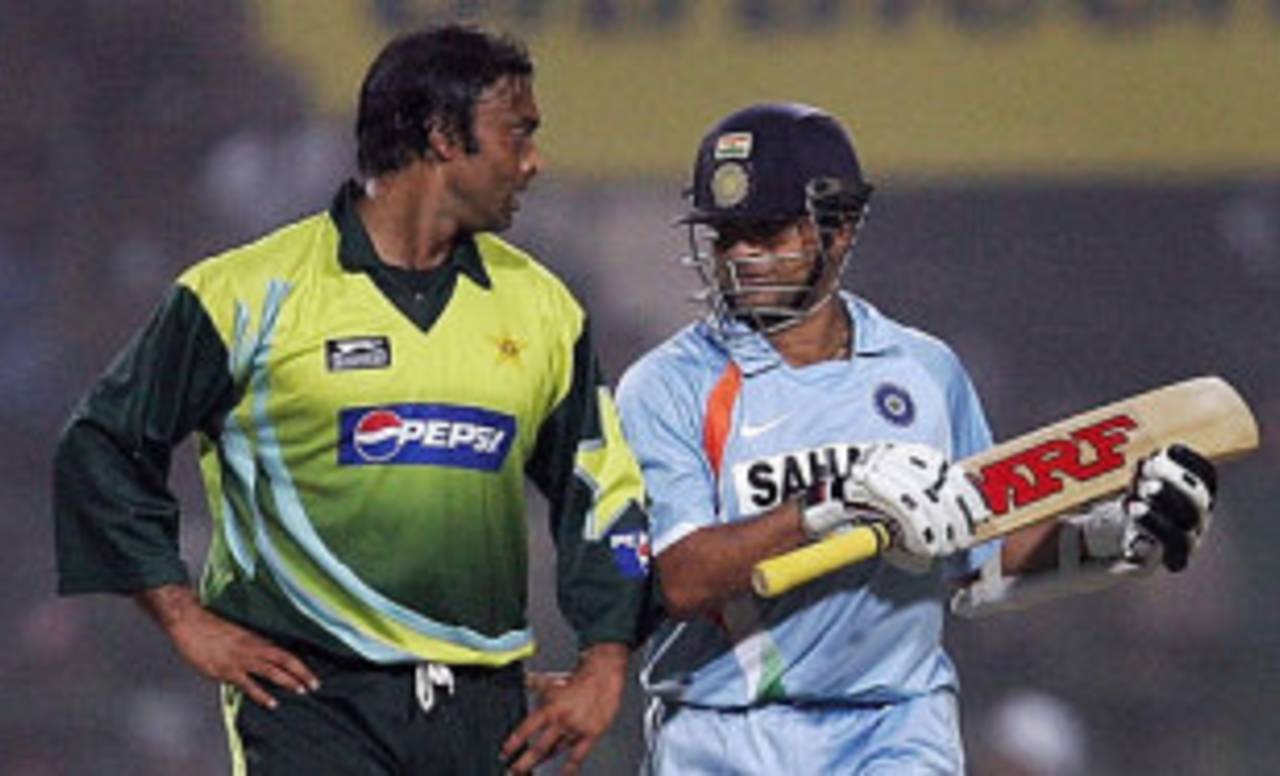Two nations better than one?
One recurring fantasy of the Indian cricket fan is to speculate about a combined India-Pakistan team
Samir Chopra
25-Feb-2013

Would Sachin Tendulkar and Shoaib Akhtar have emerged had they been in one huge nation? • AFP
One recurring fantasy of the Indian cricket fan is to speculate about a combined India-Pakistan team: If Partition had never happened, India and Pakistan may have fielded the greatest team of all times. Gavaskar and Majid would open the batting, Imran and er, Akram the bowling, Bedi and Qadir would spin anyone out, and so on. Many Indian fans indulge in this sort of rumination; they imagine that they are making some sort of statement of brotherhood and commingling, a giant Kumbaya moment of coming together on the 22 yards of the cricket pitch, a massive festival of candle-lighting at the Wagah Border, its glare bright enough to illuminate a Twenty20 game being played at the Gaddafi Stadium some thirty kilometers away. Thus the Partition, besides being responsible for the untold human misery caused by large population transfers, is also indicted on the charges of having weakened the cricket teams of the subcontinent.
I'm an Indian fan, and I've indulged in this little fantasy myself in the past. I've noticed that more often than not, Pakistani fans do not join in this little exercise in building castles in the air. The reasons are varied: sometimes it's because Pakistani fans who remember Pakistani batting greats of the past, are quite content to build up a fantasy XI that includes Majid, Hanif, Zaheer, Miandad et al with their fast bowling greats and reckon this would be good enough to take on the world. Sometimes it's because in this suggestion of unity, they perceive the elision of Pakistani identity.
Well, today, I'd like to join their camp and suggest that in purely cricketing terms, the Partition was a positive thing. If the Partition had not taken place, India and Pakistan (and Bangladesh) would have fielded one national team, and the thirty-three slots available for an international player - that are currently available for cricket players in the subcontinent - would be replaced by merely eleven. Eleven slots to fulfill the aspirations to play international cricket, earn a living from top-class cricket, and make a career out of the game, for a population of almost 1.5 billion (or is it more now?). Sounds like bad news for cricketers to me.
Due to the creation of Pakistan, a second national cricket team was formed, and eleven more opportunities to play international cricket presented themselves to first-class cricketers in the subcontinent. More cricketers were able to play international cricket and make a living from the game than would have been possible if just one nation had sent a cricket team from the subcontinent. The fallacy in Indian fans' fantasies about a combined India-Pakistan team now stands exposed: it imagines that exactly the same players would be produced in a one-nation system than are by a two-nation system. Not so.
Yes, a combined India-Pakistan team would have been able to call up on the cricketing nurseries of Lahore and Karachi in addition to those in Mumbai, Delhi, Chennai etc. But there is no guarantee a stronger team would have resulted. Many players would have been lost in the first-class system, unable to find a place in the international XI, and dropped out from the game altogether.
But, thanks to Partition, more players thought about playing at the highest levels of the game, and accordingly stayed in the game longer. Many of the greats we imagine in our fantasy India-Pakistan team might never have made it to the top level if the two countries had remained as one. We might have been denied the chance to see Asif Iqbal or Dilip Vengsarkar, or perhaps Wasim Bari or Venkataraghavan. Two channels of selection can seek out more talent than one can.
International cricket still does no justice to cricketers the world over by shoehorning them exclusively into national teams and by treating that form of the game as the most lucrative one. The cartel of the ICC and its national boards, with its Full and Associate members, which insists that players play only 'official' cricket, and seek clearance from a national board to play elsewhere, perpetuates this problem. It ensures that promising cricketers can only make it big if their 'national teams' do. Perhaps if cricketers could play for entities other than nations, more of them could make a living from playing the game, whether at home or in some other distant land. A good Afghani player would not need to wait for Afghanistan to become a Full Member of the ICC before he could start playing top-class international cricket.
Cricket players could then make a living not bound by national boundaries, just like professionals all over the world do.
My new book Brave New Pitch: The Evolution of Modern Cricket is now available at Flipkart and Amazon.
Samir Chopra lives in Brooklyn and teaches Philosophy at the City University of New York. He tweets here